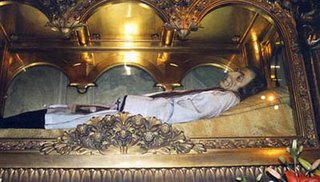At the repeated prayer of the Father Procurator-General of the Venerable Congregation called Pii Operarii (Pious Labourers) here in Rome, to propagate amongst the faithful the devotion towards St. Stanislas Kostka, as especially calculated to augment the love of our blessed Lady, Pope Pius VII., by two decrees, April 3 and May 1, 1821, and Leo XII., by two other decrees, Jan. 21 and Feb. 25, 1826 (all of which were published by the S. Congr. of Indulgences, May 13,1826), granted -
i. A plenary indulgence on the Feast of the Saint, Nov. 13, or on that Sunday on which, for the convenience of the people, this feast shall be celebrated de licentia Ordinarii, to all the faithful who, after Confession and Communion, shall visit the church or public oratory where it is celebrated, and pray according to the intention of the Sovereign Pontiff.
ii. An indulgence of seven years and seven quarantines on every one of the ten Sundays before his feast, kept in honour of the ten months of novitiate made by the Saint; to be gained by visiting the church or oratory where these Sundays are kept, and praying as above.
iii. An indulgence of 100 days every day of the Novena preceding his feast, for assisting devoutly at the said Novena with contrite heart, and praying as above.
iv. An indulgence of 100 days, once a day, to all who shall say a Pater and Ave before a picture of the Saint exposed in any church or public oratory, and pray as above, &c.
v. A plenary indulgence may be gained by the faithful by practising this exercise for a month continuously, on any one day in the month when, after Confession and Communion, they shall pray as above. Whoever, by reason of a lawful impediment, shall be unable to say in church the Pater and Ave prescribed, may say it wherever he likes on such days in the month as he is so hindered, and by so doing he shall gain this Plenary Indulgence.
vi. An indulgence of 100 days, in addition to the seven years and seven quarantines granted for the above-named ten Sundays, to all who, being contrite in heart, shall assist at the day’s Retreat called "the Retreat of St. Stanislas," wherever it is made, once in the week, and who shall pray according to the mind of the Sovereign Pontiff.
All these Indulgences, at first granted for the kingdom of the Two Sicilies, were afterwards extended to the Pontifical States for any church or public oratory where the devotion to St. Stanislas is or shall be introduced, as appears from the decree above named, Feb. 25, 1826; and the same Pope Leo XII., by another decree of the S. Congr. of Indulgences, March 3, 1827, made them available for the whole Catholic world, even for private monastic churches and oratories of seminaries, colleges, refuges, monasteries and houses of retreat for both sexes.
Furthermore the Sovereign Pontiff Pope Pius IX., by an autograph Rescript kept in the Segretaria of the S. Congr. of Indulgences, dated March 22, 1847, granted -
vii. An indulgence of 300 days, to be gained once a day by all the faithful who in honour of this Saint shall say the three following prayers for Purity, Charity, and a Good Death, adding to each one Pater, one Ave, and one Gloria.
And the same Pope, by a decree of the same S. Congr. of July 10, 1854, has vouchsafed to add -
viii. A plenary indulgence to all the faithful who shall say these prayers, with the Pater, Ave, and Gloria, once a day for a month together; to be gained by them on that day in each month when, after Confession and Communion, they shall visit a church or public oratory, and pray there for a time according to the mind of his Holiness.
THE PRAYERS.
For Purity.
St. Stanislas, my most pure patron, Angel of purity, I rejoice with thee at the extraordinary gift of virginal purity which graced thy spotless heart; I humbly pray thee, obtain for me strength to overcome all impure temptations, and inspire me with constant watchfulness to guard my purity, - that virtue so glorious in itself, and so acceptable to God.
Pater. Ave. Gloria.
For Charity.
St. Stanislas. my most loving patron, Seraph of charity, I rejoice with thee at the ardent fire of charity which kept thy pure and innocent heart always at peace and united to God; I humbly pray thee, obtain for me such ardour of divine love, that it may consume away every other earthly affection, and kindle in me the fire of His love alone.
Pater. Ave. Gloria.
For a Good Death.
St. Stanislas, my most tender and most mighty patron, Angel of purity and Seraph of charity, I rejoice with thee at thy most happy death, which arose from thy desire to contemplate our Lady assumed into heaven, and was caused by the excess of thy love for her. I give thanks to Mary, because she thus accomplished thy desires; and I pray thee, by the lustre of thy happy death, to be my advocate and my patron in my death. Intercede with Mary for me, to obtain for me a death, if not all happiness like thine, yet calm and peaceful, under the protection of Mary my advocate, and thee, my special patron.
Pater. Ave. Gloria.
Source: The Raccolta
Read more >>
i. A plenary indulgence on the Feast of the Saint, Nov. 13, or on that Sunday on which, for the convenience of the people, this feast shall be celebrated de licentia Ordinarii, to all the faithful who, after Confession and Communion, shall visit the church or public oratory where it is celebrated, and pray according to the intention of the Sovereign Pontiff.
ii. An indulgence of seven years and seven quarantines on every one of the ten Sundays before his feast, kept in honour of the ten months of novitiate made by the Saint; to be gained by visiting the church or oratory where these Sundays are kept, and praying as above.
iii. An indulgence of 100 days every day of the Novena preceding his feast, for assisting devoutly at the said Novena with contrite heart, and praying as above.
iv. An indulgence of 100 days, once a day, to all who shall say a Pater and Ave before a picture of the Saint exposed in any church or public oratory, and pray as above, &c.
v. A plenary indulgence may be gained by the faithful by practising this exercise for a month continuously, on any one day in the month when, after Confession and Communion, they shall pray as above. Whoever, by reason of a lawful impediment, shall be unable to say in church the Pater and Ave prescribed, may say it wherever he likes on such days in the month as he is so hindered, and by so doing he shall gain this Plenary Indulgence.
vi. An indulgence of 100 days, in addition to the seven years and seven quarantines granted for the above-named ten Sundays, to all who, being contrite in heart, shall assist at the day’s Retreat called "the Retreat of St. Stanislas," wherever it is made, once in the week, and who shall pray according to the mind of the Sovereign Pontiff.
All these Indulgences, at first granted for the kingdom of the Two Sicilies, were afterwards extended to the Pontifical States for any church or public oratory where the devotion to St. Stanislas is or shall be introduced, as appears from the decree above named, Feb. 25, 1826; and the same Pope Leo XII., by another decree of the S. Congr. of Indulgences, March 3, 1827, made them available for the whole Catholic world, even for private monastic churches and oratories of seminaries, colleges, refuges, monasteries and houses of retreat for both sexes.
vii. An indulgence of 300 days, to be gained once a day by all the faithful who in honour of this Saint shall say the three following prayers for Purity, Charity, and a Good Death, adding to each one Pater, one Ave, and one Gloria.
And the same Pope, by a decree of the same S. Congr. of July 10, 1854, has vouchsafed to add -
viii. A plenary indulgence to all the faithful who shall say these prayers, with the Pater, Ave, and Gloria, once a day for a month together; to be gained by them on that day in each month when, after Confession and Communion, they shall visit a church or public oratory, and pray there for a time according to the mind of his Holiness.
THE PRAYERS.
For Purity.
St. Stanislas, my most pure patron, Angel of purity, I rejoice with thee at the extraordinary gift of virginal purity which graced thy spotless heart; I humbly pray thee, obtain for me strength to overcome all impure temptations, and inspire me with constant watchfulness to guard my purity, - that virtue so glorious in itself, and so acceptable to God.
Pater. Ave. Gloria.
For Charity.
St. Stanislas. my most loving patron, Seraph of charity, I rejoice with thee at the ardent fire of charity which kept thy pure and innocent heart always at peace and united to God; I humbly pray thee, obtain for me such ardour of divine love, that it may consume away every other earthly affection, and kindle in me the fire of His love alone.
Pater. Ave. Gloria.
For a Good Death.
St. Stanislas, my most tender and most mighty patron, Angel of purity and Seraph of charity, I rejoice with thee at thy most happy death, which arose from thy desire to contemplate our Lady assumed into heaven, and was caused by the excess of thy love for her. I give thanks to Mary, because she thus accomplished thy desires; and I pray thee, by the lustre of thy happy death, to be my advocate and my patron in my death. Intercede with Mary for me, to obtain for me a death, if not all happiness like thine, yet calm and peaceful, under the protection of Mary my advocate, and thee, my special patron.
Pater. Ave. Gloria.
Source: The Raccolta







.jpg)

.jpg)














